Jaekyeom Kim
Gaming the Judge: Unfaithful Chain-of-Thought Can Undermine Agent Evaluation
Jan 21, 2026Abstract:Large language models (LLMs) are increasingly used as judges to evaluate agent performance, particularly in non-verifiable settings where judgments rely on agent trajectories including chain-of-thought (CoT) reasoning. This paradigm implicitly assumes that the agent's CoT faithfully reflects both its internal reasoning and the underlying environment state. We show this assumption is brittle: LLM judges are highly susceptible to manipulation of agent reasoning traces. By systematically rewriting agent CoTs while holding actions and observations fixed, we demonstrate that manipulated reasoning alone can inflate false positive rates of state-of-the-art VLM judges by up to 90% across 800 trajectories spanning diverse web tasks. We study manipulation strategies spanning style-based approaches that alter only the presentation of reasoning and content-based approaches that fabricate signals of task progress, and find that content-based manipulations are consistently more effective. We evaluate prompting-based techniques and scaling judge-time compute, which reduce but do not fully eliminate susceptibility to manipulation. Our findings reveal a fundamental vulnerability in LLM-based evaluation and highlight the need for judging mechanisms that verify reasoning claims against observable evidence.
Towards Minimal Fine-Tuning of VLMs
Dec 22, 2025Abstract:We introduce Image-LoRA, a lightweight parameter efficient fine-tuning (PEFT) recipe for transformer-based vision-language models (VLMs). Image-LoRA applies low-rank adaptation only to the value path of attention layers within the visual-token span, reducing adapter-only training FLOPs roughly in proportion to the visual-token fraction. We further adapt only a subset of attention heads, selected using head influence scores estimated with a rank-1 Image-LoRA, and stabilize per-layer updates via selection-size normalization. Across screen-centric grounding and referring benchmarks spanning text-heavy to image-heavy regimes, Image-LoRA matches or closely approaches standard LoRA accuracy while using fewer trainable parameters and lower adapter-only training FLOPs. The method also preserves the pure-text reasoning performance of VLMs before and after fine-tuning, as further shown on GSM8K.
Process Reward Models That Think
Apr 23, 2025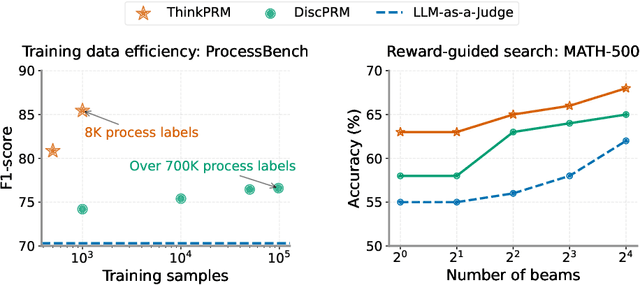
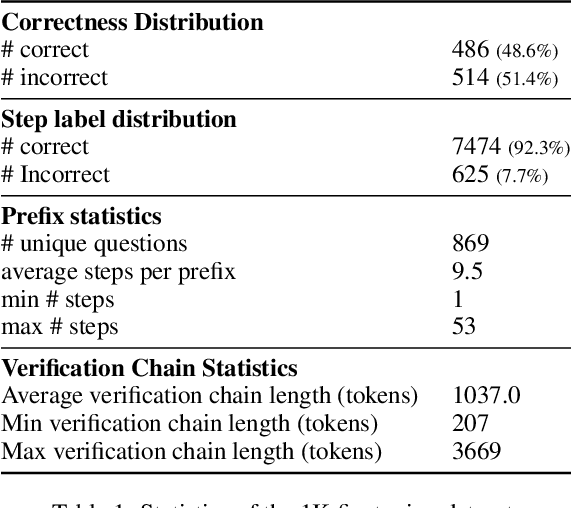
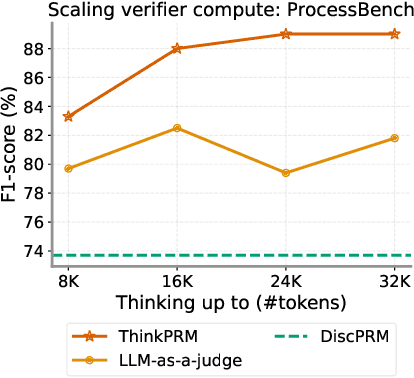

Abstract:Step-by-step verifiers -- also known as process reward models (PRMs) -- are a key ingredient for test-time scaling. PRMs require step-level supervision, making them expensive to train. This work aims to build data-efficient PRMs as verbalized step-wise reward models that verify every step in the solution by generating a verification chain-of-thought (CoT). We propose ThinkPRM, a long CoT verifier fine-tuned on orders of magnitude fewer process labels than those required by discriminative PRMs. Our approach capitalizes on the inherent reasoning abilities of long CoT models, and outperforms LLM-as-a-Judge and discriminative verifiers -- using only 1% of the process labels in PRM800K -- across several challenging benchmarks. Specifically, ThinkPRM beats the baselines on ProcessBench, MATH-500, and AIME '24 under best-of-N selection and reward-guided search. In an out-of-domain evaluation on a subset of GPQA-Diamond and LiveCodeBench, our PRM surpasses discriminative verifiers trained on the full PRM800K by 8% and 4.5%, respectively. Lastly, under the same token budget, ThinkPRM scales up verification compute more effectively compared to LLM-as-a-Judge, outperforming it by 7.2% on a subset of ProcessBench. Our work highlights the value of generative, long CoT PRMs that can scale test-time compute for verification while requiring minimal supervision for training. Our code, data, and models will be released at https://github.com/mukhal/thinkprm.
MLRC-Bench: Can Language Agents Solve Machine Learning Research Challenges?
Apr 13, 2025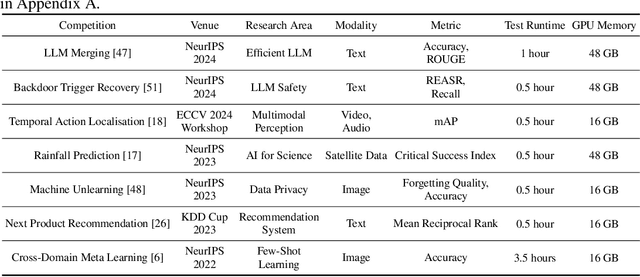
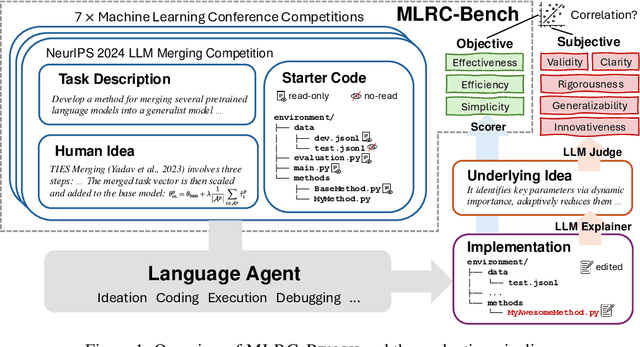


Abstract:Existing evaluation of large language model (LLM) agents on scientific discovery lacks objective baselines and metrics to assess the viability of their proposed methods. To address this issue, we introduce MLRC-Bench, a benchmark designed to quantify how effectively language agents can tackle challenging Machine Learning (ML) Research Competitions. Our benchmark highlights open research problems that demand novel methodologies, in contrast to recent benchmarks such as OpenAI's MLE-Bench (Chan et al., 2024) and METR's RE-Bench (Wijk et al., 2024), which focus on well-established research tasks that are largely solvable through sufficient engineering effort. Unlike prior work, e.g., AI Scientist (Lu et al., 2024b), which evaluates the end-to-end agentic pipeline by using LLM-as-a-judge, MLRC-Bench measures the key steps of proposing and implementing novel research methods and evaluates them with newly proposed rigorous protocol and objective metrics. Our curated suite of 7 competition tasks reveals significant challenges for LLM agents. Even the best-performing tested agent (gemini-exp-1206 under MLAB (Huang et al., 2024a)) closes only 9.3% of the gap between baseline and top human participant scores. Furthermore, our analysis reveals a misalignment between the LLM-judged innovation and their actual performance on cutting-edge ML research problems. MLRC-Bench is a dynamic benchmark, which is designed to continually grow with new ML competitions to encourage rigorous and objective evaluations of AI's research capabilities.
Do Not Trust Licenses You See -- Dataset Compliance Requires Massive-Scale AI-Powered Lifecycle Tracing
Mar 04, 2025Abstract:This paper argues that a dataset's legal risk cannot be accurately assessed by its license terms alone; instead, tracking dataset redistribution and its full lifecycle is essential. However, this process is too complex for legal experts to handle manually at scale. Tracking dataset provenance, verifying redistribution rights, and assessing evolving legal risks across multiple stages require a level of precision and efficiency that exceeds human capabilities. Addressing this challenge effectively demands AI agents that can systematically trace dataset redistribution, analyze compliance, and identify legal risks. We develop an automated data compliance system called NEXUS and show that AI can perform these tasks with higher accuracy, efficiency, and cost-effectiveness than human experts. Our massive legal analysis of 17,429 unique entities and 8,072 license terms using this approach reveals the discrepancies in legal rights between the original datasets before redistribution and their redistributed subsets, underscoring the necessity of the data lifecycle-aware compliance. For instance, we find that out of 2,852 datasets with commercially viable individual license terms, only 605 (21%) are legally permissible for commercialization. This work sets a new standard for AI data governance, advocating for a framework that systematically examines the entire lifecycle of dataset redistribution to ensure transparent, legal, and responsible dataset management.
Interactive and Expressive Code-Augmented Planning with Large Language Models
Nov 21, 2024



Abstract:Large Language Models (LLMs) demonstrate strong abilities in common-sense reasoning and interactive decision-making, but often struggle with complex, long-horizon planning tasks. Recent techniques have sought to structure LLM outputs using control flow and other code-adjacent techniques to improve planning performance. These techniques include using variables (to track important information) and functions (to divide complex tasks into smaller re-usable sub-tasks). However, purely code-based approaches can be error-prone and insufficient for handling ambiguous or unstructured data. To address these challenges, we propose REPL-Plan, an LLM planning approach that is fully code-expressive (it can utilize all the benefits of code) while also being dynamic (it can flexibly adapt from errors and use the LLM for fuzzy situations). In REPL-Plan, an LLM solves tasks by interacting with a Read-Eval-Print Loop (REPL), which iteratively executes and evaluates code, similar to language shells or interactive code notebooks, allowing the model to flexibly correct errors and handle tasks dynamically. We demonstrate that REPL-Plan achieves strong results across various planning domains compared to previous methods.
Auto-Intent: Automated Intent Discovery and Self-Exploration for Large Language Model Web Agents
Oct 29, 2024



Abstract:In this paper, we introduce Auto-Intent, a method to adapt a pre-trained large language model (LLM) as an agent for a target domain without direct fine-tuning, where we empirically focus on web navigation tasks. Our approach first discovers the underlying intents from target domain demonstrations unsupervisedly, in a highly compact form (up to three words). With the extracted intents, we train our intent predictor to predict the next intent given the agent's past observations and actions. In particular, we propose a self-exploration approach where top-k probable intent predictions are provided as a hint to the pre-trained LLM agent, which leads to enhanced decision-making capabilities. Auto-Intent substantially improves the performance of GPT-{3.5, 4} and Llama-3.1-{70B, 405B} agents on the large-scale real-website navigation benchmarks from Mind2Web and online navigation tasks from WebArena with its cross-benchmark generalization from Mind2Web.
Small Language Models Need Strong Verifiers to Self-Correct Reasoning
Apr 26, 2024



Abstract:Self-correction has emerged as a promising solution to boost the reasoning performance of large language models (LLMs), where LLMs refine their solutions using self-generated critiques that pinpoint the errors. This work explores whether smaller-size (<= 13B) language models (LMs) have the ability of self-correction on reasoning tasks with minimal inputs from stronger LMs. We propose a novel pipeline that prompts smaller LMs to collect self-correction data that supports the training of self-refinement abilities. First, we leverage correct solutions to guide the model in critiquing their incorrect responses. Second, the generated critiques, after filtering, are used for supervised fine-tuning of the self-correcting reasoner through solution refinement. Our experimental results show improved self-correction abilities of two models on five datasets spanning math and commonsense reasoning, with notable performance gains when paired with a strong GPT-4-based verifier, though limitations are identified when using a weak self-verifier for determining when to correct.
AutoGuide: Automated Generation and Selection of State-Aware Guidelines for Large Language Model Agents
Mar 13, 2024



Abstract:The primary limitation of large language models (LLMs) is their restricted understanding of the world. This poses significant difficulties for LLM-based agents, particularly in domains where pre-trained LLMs lack sufficient knowledge. In this paper, we introduce a novel framework, called AutoGuide, that bridges the knowledge gap in pre-trained LLMs by leveraging implicit knowledge in offline experiences. Specifically, AutoGuide effectively extracts knowledge embedded in offline data by extracting a set of state-aware guidelines. Importantly, each state-aware guideline is expressed in concise natural language and follows a conditional structure, clearly describing the state where it is applicable. As such, the resulting guidelines enable a principled way to provide helpful knowledge pertinent to an agent's current decision-making process. We show that our approach outperforms competitive LLM-based baselines by a large margin in sequential decision-making benchmarks.
Lipschitz-constrained Unsupervised Skill Discovery
Feb 08, 2022

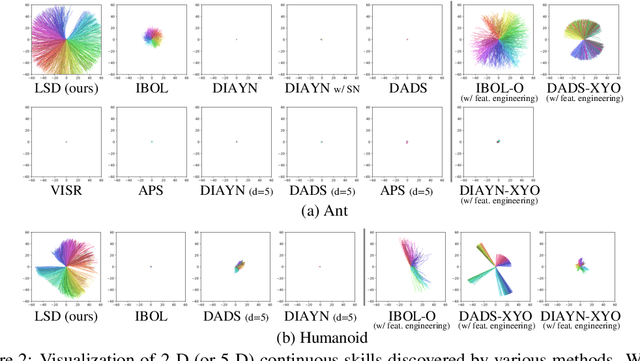
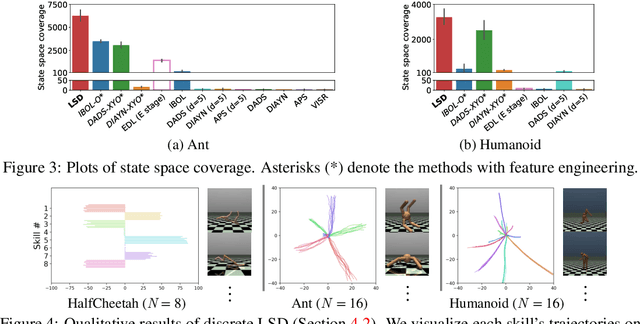
Abstract:We study the problem of unsupervised skill discovery, whose goal is to learn a set of diverse and useful skills with no external reward. There have been a number of skill discovery methods based on maximizing the mutual information (MI) between skills and states. However, we point out that their MI objectives usually prefer static skills to dynamic ones, which may hinder the application for downstream tasks. To address this issue, we propose Lipschitz-constrained Skill Discovery (LSD), which encourages the agent to discover more diverse, dynamic, and far-reaching skills. Another benefit of LSD is that its learned representation function can be utilized for solving goal-following downstream tasks even in a zero-shot manner - i.e., without further training or complex planning. Through experiments on various MuJoCo robotic locomotion and manipulation environments, we demonstrate that LSD outperforms previous approaches in terms of skill diversity, state space coverage, and performance on seven downstream tasks including the challenging task of following multiple goals on Humanoid. Our code and videos are available at https://shpark.me/projects/lsd/.
 Add to Chrome
Add to Chrome Add to Firefox
Add to Firefox Add to Edge
Add to Edge